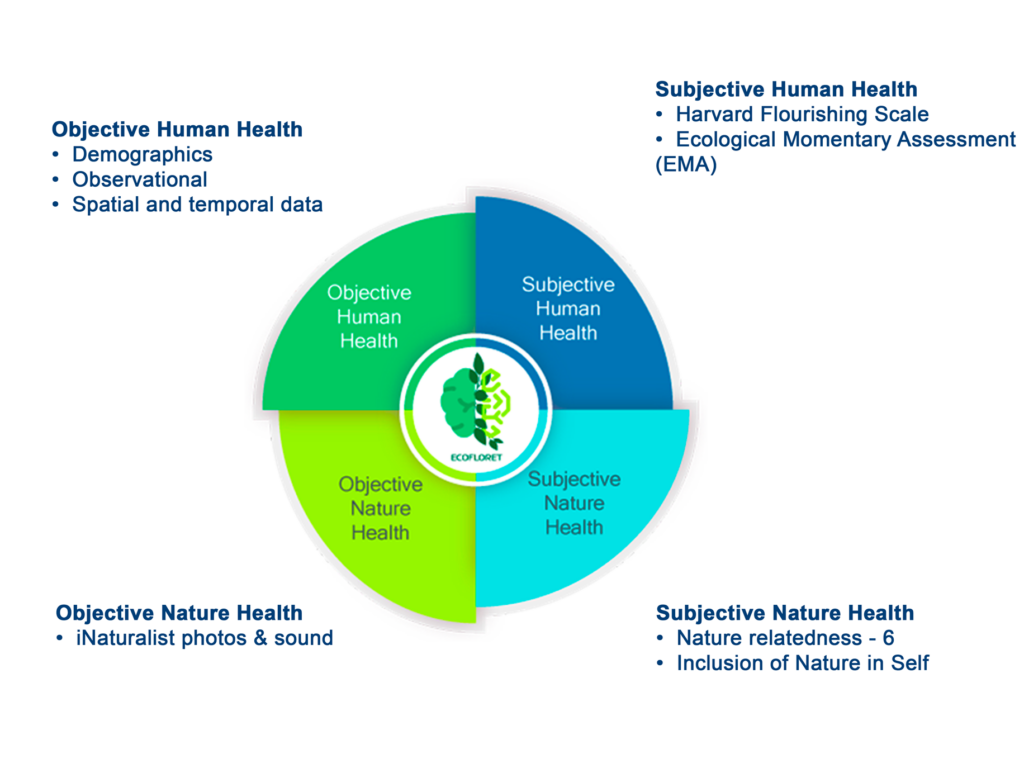Project Aims
Oxford’s Worcester College is renowned for its remarkable green spaces. Collaborating with the College’s sustainability team, we are exploring how nature and people can flourish together. Worcester College hosted this year’s City Nature Challenge, a global event encouraging cities to celebrate biodiversity.
We have partnered with the Worcester College sustainability team, working with students, educators, gardeners, and researchers to better understand how nature and humans can flourish together.
The aim of this project, as part of the City Nature Challenge, is to investigate how nature-based activities, like observing and recording biodiversity through the iNaturalist app, impact human wellbeing and our connection to the natural world.
Methods
As part of the City Nature Challenge and using our ECOFLORET toolkit, we combined measures of biodiversity, gathered using the iNaturalist mobile app, with assessments of subjective human flourishing, taken by using validated questionnaires, momentary experience sampling, and participant observations.

Co-production and Collaborations
The project is a collaboration between Worcester College’s Sustainability Team led by Prof. Lisa Wedding, Department of Geography, and Prof. Ilina Singh and Dr. Katrin Wilhelm from the Oxford’s Department of Psychiatry.
A unique and important aspect of this study was our co-productive approach. Co-researchers, including members of the public, and Worcester College students and staff, actively participated in reviewing and testing the tools and protocols used for data collection. Furthermore, members of the public, including children and families who attended the City Nature Challenge event, also played a key role as co-researchers.
Involving co-researchers in our design and execution aimed to enhance the practicality, utility, and engagement for participants.

Importance
We are investigating how engaging with nature through citizen science, such as using the iNaturalist app, can enhance human wellbeing and strengthen our connection to the environment. By understanding the psychological, social, and environmental mechanisms driving these relationships – such as curiosity, purpose, and social belonging – we aim to develop tools and programmes that can foster both human and planetary flourishing. This is especially important as increased urbanization and modern lifestyles can work to further disconnect people from their natural environment. Insights from this research will help to create practical, evidence-based interventions that can support mental health, encourage environmental stewardship, and promote collective flourishing.
Key findings
Co-researchers reported meaningful interactions with nature, highlighting the impact of elements like birdsong, water, and biodiversity on their experiences. Tools like iNaturalist facilitated curiosity and connection, with feedback underscoring the importance of mindful observation to foster enhanced well-being.
Applications
These findings will guide our future research by informing protocol adjustments, including the development of guided activities targeting specific psychological and social mechanisms that drive ecological and collective flourishing, such as during our E-Co-Flo Walk pilots.
They will also enhance our ECOFLORET toolkit, a suite of tools designed to monitor and support ecological collective flourishing.
In the Oxford College context, these insights will enrich teaching initiatives, such as sustainability or biodiversity-related classes for undergraduate students, fostering experiential learning and interdisciplinary engagement.
Key Researchers:
Dr Katrin Wilhelm, OH BRC Flourishing and Wellbeing Theme
Joe Boyle, School of Geography and the Environment
Find out about our E-Co-Flourishing Walk pilots here
Listen to Joseph Boyle’s podcast
Joe is a Sustainability Research Assistant at Worcester College. In this podcast he talks about sustainability research at Worcester College, its biodiversity survey and how clean the water in the lake is.

